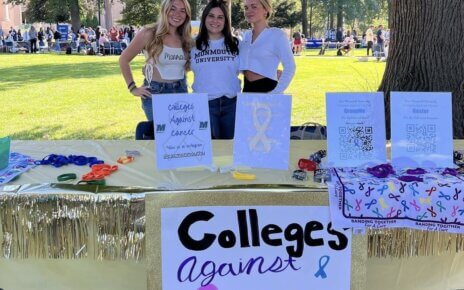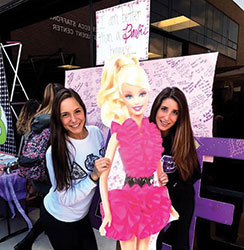In what seems like one minute, you’re shouting the lyrics to every song of one of your favorite bands as you watch them perform live; the next you can’t remember ever being there in the first place or who you were with. At least that’s what happened to me.
Long story short, as a type one diabetic, my blood sugar levels rose extremely high and caused my body to go into cardiac arrest three times following a concert I had attended the night before. The loss of oxygen to my brain during these arrests caused what is known as an anoxic brain injury which, in my case, means a short term memory loss.
For weeks I was weak from being bed-ridden, I could not remember the names or faces of the doctors and nurses who came to see me and I could not even gather the strength to swallow a sip of water without choking.
Now, while I can handle daily tasks such as eating solid food or even walking long distances, getting back to a normal routine has been difficult.
For example, I have to use alarms and calendar reminders for things I used to just know such as what time I am due into work or when and where my next class is. I even take pictures of where I am parked so I can easily find my car when it’s time to leave anywhere with multiple parking lots such as campus or the mall.
People start to look at you strangely when they ask what you’re doing later that day or what time your next class is and you have to check your phone calendar to answer them.
Being with friends becomes different as well. It goes one of two ways. They become more cautious of what they say, especially when referencing old memories you’ve shared with them because they do not know what you remember or how you will react if you have lost a particular memory.
On the other hand, they treat you exactly like they used to, forgetting that you have a memory loss and conversing like they previously had before the brain injury because upon first impression, you don’t seem that different.
Dr. Gary Handler, specialist professor of psychological counseling says, “If memory function is impaired they may not remember events, names, or even not recognize faces. Clearly this will impact their social interactions.”
Handler continues, “Finally, the fact that they now have some disability, their friends may react differently to them which can cause serious emotional upheavals.”
It messed with my confidence level. I felt less intelligent when I couldn’t remember a specific event that someone would bring up, even my friends or family. I would nod along and pretend I knew what they were talking about for a long time. Now I’m at the point where I can ask people to remind me of what happened when they talk about a certain memory that I cannot recall.
According to Handler, “the injury can impact the person’s ability to communicate with their friends; personality may change, for example, if a part of the brain that is involved in fear processing changes, the person may become highly risk taking, or in fact fear almost everything.”
Handler adds, “Let’s not lose sight of the fact that the victim is dealing with potentially a major loss of sensory, cognitive or behavioral capacity which changes one’s outlook on life.”
My view on many aspects of daily life has changed. As an avid reader before my brain injury, I lost interest in all of the books I would have potentially loved because I knew that I would not remember the story as I continued through the chapters.
I stopped listening to new kinds of music that I normally would because I knew I would forget the lyrics. As a music enthusiast, this part was especially difficult for me. No matter how much I wanted to remember the words to a song or the artist who sang it, it became near impossible. This was an incredibly frustrating experience.
The age of the victim is also important in recovery, according to Handler. “The last part of the brain to complete is the frontal region, which allows us to make good decisions, execute plans, etcetera.”
He said, “One can imagine the impact of a brain injury to young adults, who are more risk taking due to the still developing frontal region.” Handler added that the human brain continues to develop until age 20-25.
Being 21 at the time, I still had hope that I would return to almost normal. Therapists predicted that I could regain up to 98 percent of my memory back.
Recovery also depends on the area of the brain affected. “Some parts of the brain are more plastic and thus can recover, or the function can be substituted for by an undamaged part. But many parts may take a long time, or never recover the lost functionality,” Handler contends. Timing is also essential in overall recovery. It is critical to get quick assessment and treatment.
After going to many different cognitive therapists and neuropsychologists, I am beginning to see improvement in my own memory, even if it’s something as small as remembering to turn out the light before I leave a room. It is a slow road for certain, but I’m moving forward inch by inch.
Handler said, “Recovery is likely to be measured in weeks, months and years depending on the extent and location,”
My family and friends have been an incredible form of support, as well, in terms of reminding me of little things I might have forgotten or reassuring me that I’m not any different than who I was before the brain injury. Handler said, “It is critical that the victim be surrounded by caring, understanding friends who can support recovery.”
The greatest thing about this otherwise horrible experience is the group of people who cheer me on in my recovery. Those who acknowledge that I am a different person but address me as if nothing has changed are perhaps the greatest asset in my continuing progress. Because of them I dream of leading a normal life someday soon.



